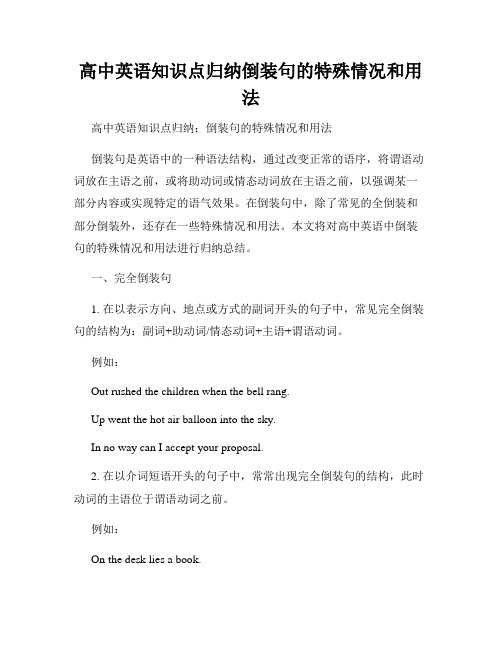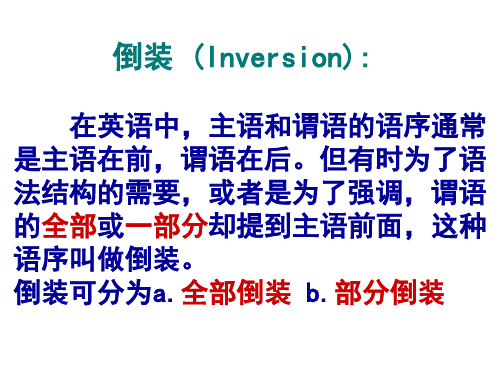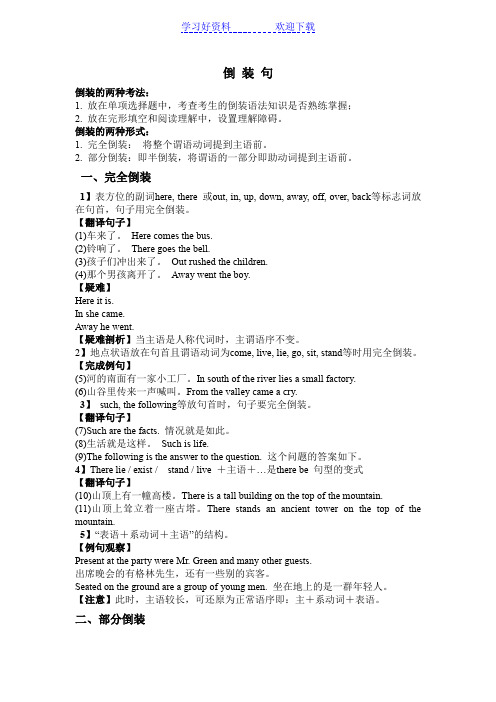高中英语语法:倒装
高中英语知识点归纳倒装句的特殊情况和用法

高中英语知识点归纳倒装句的特殊情况和用法高中英语知识点归纳:倒装句的特殊情况和用法倒装句是英语中的一种语法结构,通过改变正常的语序,将谓语动词放在主语之前,或将助动词或情态动词放在主语之前,以强调某一部分内容或实现特定的语气效果。
在倒装句中,除了常见的全倒装和部分倒装外,还存在一些特殊情况和用法。
本文将对高中英语中倒装句的特殊情况和用法进行归纳总结。
一、完全倒装句1. 在以表示方向、地点或方式的副词开头的句子中,常见完全倒装句的结构为:副词+助动词/情态动词+主语+谓语动词。
例如:Out rushed the children when the bell rang.Up went the hot air balloon into the sky.In no way can I accept your proposal.2. 在以介词短语开头的句子中,常常出现完全倒装句的结构,此时动词的主语位于谓语动词之前。
例如:On the desk lies a book.Under the bridge flows a river.二、强调句型倒装句常用于强调句型,通过改变正常语序,将被强调的部分提前至句首,以突出重要信息。
1. It is/was + 被强调部分 + that/who + 句子其余部分。
用于强调句子的主语、宾语、地点、时间等。
例如:It is Jane who won the singing competition.It was at the park where they met for the first time.It was yesterday that I finished reading the book.2. What/How + be 动词 + 主语 + 谓语动词 + 其他成分。
用于强调句子的母语、宾语、状语等。
例如:What I want is a peaceful world.How beautiful the sunset is!How hard he works!三、倒装句用于祝愿句和条件句1. May/Should + 主语 + 谓语动词.May you have a wonderful journey!Should you need any assistance, feel free to contact us.2. If + should/ were + 主语 + 谓语动词.If it should rain tomorrow, we will cancel the outdoor activity.If I were you, I would apologize to him.四、疑问句的倒装在一般疑问句中,主语和助动词/情态动词倒装。
高中英语语法 倒装句语法课件(共63张PPT)

B 3. (2005江苏) ________ about wild plants that they decided to
make a trip to Madagascar for further research.
A. So curions the couple was B. So curious were the couple
open.
A. Try as she might
B. As she might try
C. She might as try
D. Might she as try
33. __D____, the boy knows a lot about computer.
A. Though is he young B. As is he young
3) 介词短语+be+主语 Among the goods are Christmas trees, flowers and toys.
6. 为了保持句子平衡或为了强调表语或状语,为 了使上下文紧密衔接。
a. inside the pyramids are the burial rooms for the s and queens.
如果后一个句子只是单纯的重复前面句子的意 思,则不倒装。
“It is hot today.” “So it is.”
“He finished it on time.” “So he did.”
当前面的句子中主语、谓语或肯否定形式不同时, 则用so it is with….,或it is the same with …句型来表 示。
A are hanging B hanged C hang D hangs
高中英语倒装句的归纳总结

高中英语倒装句的归纳总结倒装句是英语中的一种特殊语法结构,通常在句子中,主语和谓语动词的位置是固定的,即主语在前,谓语动词在后。
然而,在某些情况下,为了强调句子中的某个成分,或者为了满足特定的语法要求,我们需要将主语和谓语动词的位置颠倒,这就是倒装句。
倒装句在高中英语中经常出现,因此对其进行归纳总结具有重要的意义。
一、全部倒装全部倒装是指句子中的主语和谓语动词完全颠倒的情况,常见于以下几种情况:1. 在以副词here, there或者out, in等表示地点的副词开始的句子中,常常采用全部倒装。
Here comes the bus.(汽车来了。
)There goes the bell.(铃声响了。
)Out rushed the children.(孩子们冲了出去。
)2. 在以表示方向的副词和介词短语开头的句子中,常采用全部倒装。
Down went the sun.(太阳下山了。
)In came the teacher.(老师进来了。
)3. 在以表示否定意义的副词或副词短语开头的句子中,常采用全部倒装。
Never have I seen such a beautiful view.(我从未见过如此美景。
)Not only does he play basketball, but he also plays football.(他不仅打篮球,还踢足球。
)二、部分倒装部分倒装是指只将谓语动词和助动词或情态动词提到主语之前,而将其他成分保持原来顺序的情况。
常见的部分倒装有以下几种情况:1. 在以表示否定意义的副词或副词短语位于句首时,动词与主语之间采用部分倒装。
Never have I been to Paris.(我从未去过巴黎。
)Hardly had she finished her speech when they clapped.(她刚刚讲完演讲就被他们鼓掌了。
)2. 在以so和neither引导的倒装句中,动词与主语之间采用部分倒装。
高中英语语法倒装总结全

倒装句倒装的两种考法:1. 放在单项选择题中,考查考生的倒装语法知识是否熟练掌握;2. 放在完形填空和阅读理解中,设置理解障碍。
倒装的两种形式:1. 完全倒装:将整个谓语动词提到主语前。
2. 部分倒装:即半倒装,将谓语的一部分即助动词提到主语前。
一、完全倒装1】表方位的副词here, there 或out, in, up, down, away, off, over, back等标志词放在句首,句子用完全倒装。
【翻译句子】(1)车来了。
Here comes the bus.(2)铃响了。
There goes the bell.(3)孩子们冲出来了。
Out rushed the children.(4)那个男孩离开了。
Away went the boy.【疑难】Here it is.In she came.Away he went.【疑难剖析】当主语是人称代词时,主谓语序不变。
2】地点状语放在句首且谓语动词为come, live, lie, go, sit, stand等时用完全倒装。
【完成例句】(5)河的南面有一家小工厂。
In south of the river lies a small factory.(6)山谷里传来一声喊叫。
From the valley came a cry.3】such, the following等放句首时,句子要完全倒装。
【翻译句子】(7)Such are the facts. 情况就是如此。
(8)生活就是这样。
Such is life.(9)The following is the answer to the question. 这个问题的答案如下。
4】There lie / exist / stand / live +主语+…是there be 句型的变式【翻译句子】(10)山顶上有一幢高楼。
There is a tall building on the top of the mountain.(11)山顶上耸立着一座古塔。
高中英语语法倒装句

1.His mother had talked to him for many minutes while he was watching TV, but ____. A. a little did he hear B. little did he hear C. little heard he D. a little heard he 2.—— Hello, Zhu Hua. I’ll have to return to Canada because I’ve worked here for a year. —— _____! What time flies B. How time flies C. What does time fly D. How does time fly 3. During the war, ____but also he lost his wife and his child. not was his job in the lab taken away B. not only was his job in the lab taken away C. not merely his job in the lab was taken away D. not just was taken away his job in the lab
C
D
11.— The old man wouldn’t stay at home for a rest even if it rained. — ____.He would feel sick if he stayed home for one day. A. So would my grandpa B. So wouldn’t my grandpa C. Neither would my grandpa D. Nor wouldn’t my grandpa 12.___for us to surf (冲浪) on the sea in summer! A. What exciting is it B. How exciting is it C. What exciting it is D. How exciting it is 13.By no means ___ to our plan for the trip. A. will she agree B. she will agree C. agrees she D. will agree she
高中英语知识点归纳倒装句的用法总结

高中英语知识点归纳倒装句的用法总结高中英语知识点归纳:倒装句的用法总结倒装句是英语语法中的一种特殊语法结构,常见于各种语言形式中。
倒装句通常在句子中,把谓语动词放在主语之前,从而改变了正常语序。
在英语学习中,倒装句是一个重要的知识点,掌握了它的基本用法,可以使我们的表达更加地准确、得体。
本文将对高中英语学习中与倒装句有关的知识进行归纳和总结,以便同学们更好地掌握和运用。
一、完全倒装句完全倒装句是指把整个谓语动词放在主语之前,常用于以下几种情况:1.以副词或介词词组开头的句子:- Never have I seen such a beautiful sunset. 我从未见过如此美丽的日落。
- In front of us stood a tall building. 在我们面前矗立着一座高楼。
2.以表示否定意义的副词开头的句子:- Not only did she forget my birthday, but she also didn't apologize. 她不仅忘记了我的生日,而且也没有道歉。
3.以表示“只有、仅仅、唯一”等意义的副词或词组开头的句子:- Only by working hard can you achieve your goals. 只有通过努力工作,你才能实现自己的目标。
4.以表地点的副词或介词短语放在句首,句子的主语为there时:- There is a cat under the table. 桌子下有一只猫。
- Here comes the train. 火车来了。
二、部分倒装句部分倒装句是指把助动词放在主语之前,常用于以下几种情况:1.以表示否定的词或短语开头的句子,包括never、not、seldom、hardly等:- Never have I seen such a talented musician. 我从未见过如此有天赋的音乐家。
2.以表示“只有、仅仅、唯一”等意义的副词或词组开头的句子,包括only、hardly等:- Only when the sun sets can we see the stars in the sky. 只有太阳下山后,我们才能看到天空中的星星。
高中英语语法倒装句讲解

高中英语语法倒装句讲解倒装句倒装句是英语中常见的一种句式,它的特点是把谓语动词放在主语之前,以达到强调的效果。
在倒装句中,常用的有全部倒装和部分倒装两种形式。
一、全部倒装全部倒装即把整个谓语部分放在主语之前。
当副词here。
there。
in。
out。
up。
down。
away。
back。
then。
ahead,off。
over等位于句首、谓语动词常为be。
come。
go。
follow。
run。
rush。
fly。
fall等不及物动词,而且主语又是名词时,用完全倒装。
注意:此类倒装只限于一般现在时和一般过去式,不用进行时态并且若主语是代词时,不用倒装。
同学们可借助下面的图形速记用于完全倒装的词。
1.介词短语(地点状语)+不及物动词+主语A beautiful girl sits under the tree。
= Under the tree sits a beautiful girl。
树下坐着一位漂亮的女孩。
A big ___ of the lake。
= South of the ___的南边是一个大超市。
A modern swimming pool is located 20 miles east of our school。
= 20 miles east of our school ___。
我们学校向东20英里有一个现代化的游泳池。
Piles of old books。
magazines and newspapers are on the floor。
= On the floor were piles of old books。
magazines and newspapers。
地板上是一堆堆旧的书报杂志。
2.表方向、地点的副词(here。
there。
up。
down。
away)+不及物动词+主语,构成的全部倒装句___ ___ barking fiercely。
away fled the ___。
听到狗的狂叫声,小偷逃掉了。
高中英语倒装句(完整版详细讲义+随堂练习)

Grammar of the Inversion (Module 5 Unit 4)倒装句英语最基本的语序是主语在前, 谓语动词在后。
但有时由于句子结构的需要或表示强调, 就要采用倒装形式。
倒装分两种情况: 1)将谓语动词完全移到主语之前称为完全倒装, 2)只将助动词或情态动词放到主语之前称为部分倒装。
并且强调性倒装和以so, neither, nor开头的句子是高考例题的热点。
一、倒装句的意义1.用倒装构成疑问句,适应一定的语法结构的需要。
.in?Was the People's Liberation Army founded in 1927?2.为了强调某一部分, 而把这部分放到句首, 构成倒装。
t.fo.schoo.thi.term.So early did he come to school that no other students came.二、倒装的用法完全倒装1.在“ther.be”结构里, there是引导词, 主语在be后。
在“there + be”结构中的谓语动词有时不用be , 而用表示类似“存在”观念的其他不及物动词。
如: live, stand, come, lie, flow, enter, rise 和appear等。
e.g.Ther.i..bo.o.th.table.There came shouts for help from the river.There lies a large wheat field in front of the house.Many years ago there lived an old man in the wooden house.2.为了表达生动, 有时把表地点、方位的副词, 如here, there, now , then,, thus ,up, down, out, off, over, away, in等放在句首, 同时把谓语动词放在主语之前, 在here, there等副词开头的某些句子里(要用一般现在时态)。
- 1、下载文档前请自行甄别文档内容的完整性,平台不提供额外的编辑、内容补充、找答案等附加服务。
- 2、"仅部分预览"的文档,不可在线预览部分如存在完整性等问题,可反馈申请退款(可完整预览的文档不适用该条件!)。
- 3、如文档侵犯您的权益,请联系客服反馈,我们会尽快为您处理(人工客服工作时间:9:00-18:30)。
高中英语语法:倒装
1.完全倒装
(1)用在以here,there,now,then,in,out,up,
down,round,over,away,back,forward等词开头的句子中,表示强调。
其句式为:
Now comes your turn.现在该你了。
Out rushed the boys.孩子们冲出去了。
这种倒装句中的主语只能是名词,不可用人称代词。
如果主语为称代词,谓语动词须放在主语后边。
如:
In he came and the lesson began.
他一进来就开始上课。
Back he went again.他又回去了。
(2)用在“There be…”句型中。
如:
There is no harm in trying.
试一下是没有害处的。
There are about ninety students in this class.
这个班大约有90名学生。
(3)当表示地点的介词短语作状语放于句首时。
如:
In front of the farmhouse sat a peasant boy.
一个农家小男孩坐在农舍前。
On the top of the hill stands an old temple.
山顶上有一座古庙。
(4)表语置于句首时。
表语+系动词+主语
l)形容词+系动词+主语
Present at the meeting were some teachers and students.一
些老师和学生出席了会议。
Difficult was the question.so we could not work it out.问题很难,所以我们算不出来。
2)过去分词+系动词+主语
Gone was the necklace that she had borrowed from her friend.她从朋友那儿借的项链丢了。
Gone are the days when they could do what they liked to the Chinese people.他们对中国人民为所欲为的日子一去不复返了。
3)介词短语+系动词+主语
Among the goods are Christmas trees, flowers and toys.货物中有圣诞树,花和玩具。
In the middle of the yard is a fountain.
院子中心有一个喷泉。
(5)在以so,nor,neither开头的句子中,以避免重复。
So(nor,neither)+助动词+主语
此句型中的助动词必须和上面句子的谓语一致。
如:
①—I have a very interesting toy.
我有一个有趣的玩具。
-So do I.我也有。
②-I won't go to his birthday party.
我不去参加他的生日晚会。
一Nor will any of our classmates.
我们的同学也没有一个人去。
so如果只是重复前面的话,或对前面的内容表示肯定,不能倒装; 句型为:So+主语+助动词。
如:
①一Tomorrow will be Friday.
明天是星期五。
一So it will.是的。
②-Mum,you promised to buy me a new bike.
妈妈,你答应过给我买一辆新自行车。
-So I did.是的,我答应过。
2.半倒装
(l)疑问句
Why are you standing there?
你为什么站在那儿?
How long have you been studying English?
你学英语有多久了?
如果疑问代词在句中作主语,句子不用倒装。
What is the matter with your nose?
你的鼻子怎么啦?
Who is really against you?谁真正反对你?
Which book is the best that you have ever read?你所读过的书中哪一本是最好的?
(2)虚拟语气的条件句省略了if后。
如:
Were I in his shoes, I would do it in a different way.如果我处在他的位置,我会用另一种方法处理这件事。
Had he known in time,he would have come.
如果他及时知晓,他会来的。
(3)在as引导的让步状语从句中。
(请参阅状语从句5)
(4)在以否定或半否定的副词开头的句子中用半倒装,这类词常见的有: hardly, little,seldom,rarely,scarcely, never, not only,not till….如:
Never have I been asked to do that before.
以前从未有人让我做过那样的事。
Not till he got home did he realize that he had lost his keys.
直到回到家他才发现他把钥匙丢了。
当little,not only…but also放在句首修饰或连接两个主语时,句子不用倒装。
如:
Little work was done yesterday.
昨天没干什么。
Not only the students but also the teacher likes playing thi game.
不仅学生并且老师也爱玩这个游戏。
not移至句首引起倒装时,不能把not单独提前,要和有关系的短语一同前置。
如:
Not only was everything he had taken away from him, but also his German citizenship.
不仅他所拥有的被剥夺了,还有他的德国国籍也被剥夺了。
Not until yesterday did I hear from my father.
直到昨天我才收到我爸爸的来信。
(5)用于hardly…when…,scarcely…when…,和no soonerr…than…句型中。
如:
Hardly had he arrived when she started complaining.他刚一到她就开始抱怨。
No sooner had he gone to sleep than the telephone rang once more.
他刚一入睡电话铃又响了。
(6)用在以only开头的句子中。
Only when one loses freedom does one know its value.只有当一个人失去自由的时候他才知道自由的珍贵。
Only by shouting at the top of his voice was he able to make himself heard.
只有高声叫喊,别人才能听见他。
only放在句首修饰主语时句子不倒装。
(7)直接引语的部分或全部放在句首,句子要用倒装。
此时主语必须是名词,如果主语为代词,句子不用倒装。
如:
“Who is the girl in red?”asked Liming
“穿红衣服的女孩是谁?’李明问。
“Let’s go to have a drink,’said the man.
‘咱们去喝一杯”,那个人说。
(8)一些表示祝愿的句子要用倒装。
如:
Long live our beloved motherland!
我们可爱的祖国万岁!
Suffice it to say that we have been delayed by stoms.我们给大雨耽搁了,别的没有可说的了。
